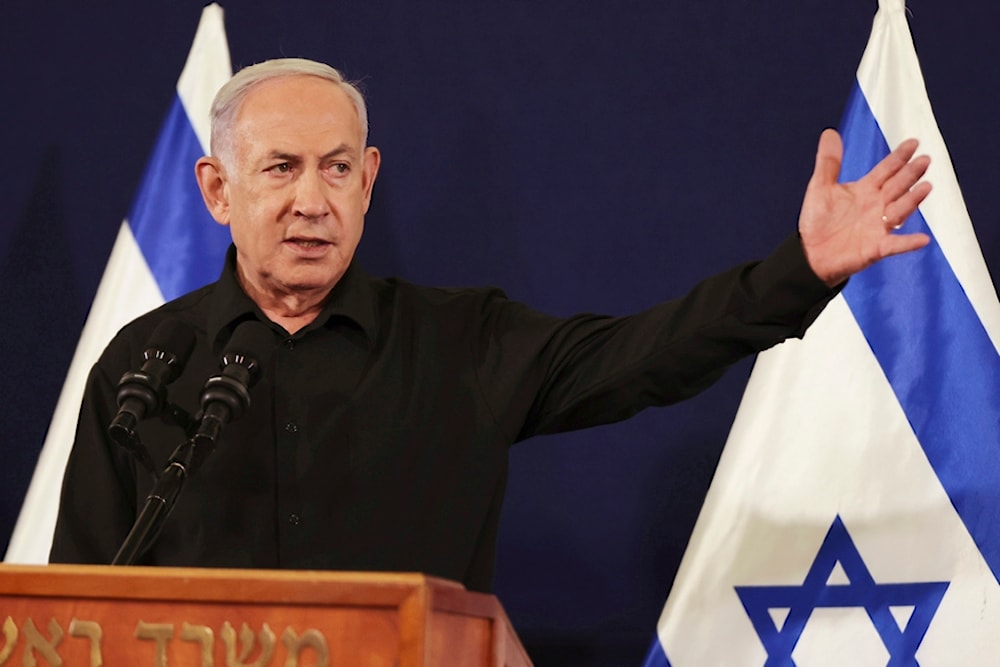WashPo asks if Netanyahu's political career coming to an end
Despite the ongoing genocide and the killing of over 16,000 Palestinians in Gaza, Netanyahu's legal challenges persist, and it is unlikely that he may remain any longer in office, writer Ishaan Tharoor says.
-

Israeli Prime Minister Benjamin Netanyahu speaks during a press conference with Defense Minister Yoav Gallant and Cabinet Minister Benny Gantz in the Kirya military base in occupied Palestine Oct. 28, 2023 (AP)
An op-ed written by analyst Ishaan Tharoor for Wahington Post on Tuesday discussed the fact that Israeli Prime Minister Benjamin Netanyahu is currently facing two significant challenges, and he is unlikely to succeed at any of them.
On one front, he is leading a war on Gaza and the resistance that carried out an operation on October 7, and on another front, he is dealing with the resumption of trial proceedings related to long-standing corruption allegations against him.
The charges include bribery, fraud, and breach of trust, making him the first Israeli prime minister to be indicted while in office. The resumption of the trial follows the end of an emergency at Israeli courts, which had halted non-urgent cases in the aftermath of the October 7 resistance operation.
Despite the ongoing genocide and the killing of over 16,000 Palestinians in Gaza, Netanyahu's internal legal challenges persist. His legal troubles have been a significant backdrop to Israeli politics for almost half a decade, influencing his relationship with the regime's judiciary and media.
Read more: Netanyahu back in court after a two-month break
The October 7 operation has heightened public scrutiny of Netanyahu. While there is a call for tough action against the resistance, many Israelis also hold Netanyahu accountable for the failures of the Israeli security apparatus.
The friction between Netanyahu's cabinet and the families of captives has resonated in Israeli society, leading to protests and calls for the prime minister's resignation. Opposition leader Yair Lapid and other figures have urged Netanyahu to step down, citing his failure and loss of trust.
Amid these challenges, Netanyahu is navigating both the genocide in Gaza and the legal proceedings.
The future appears uncertain for Netanyahu, with experts questioning his ability to remain in office after the war.
Meanwhile, "Israel's" genocidal campaign has drawn international concern due to the rising death toll and widespread devastation, prompting calls for a mediated postwar arrangement.
Read more: Israeli media: Netanyahu-Gallant discord growing more evident
The goals and strategies for the postwar period remain unclear, with differences between "Israel" and the Biden administration on issues such as civilian casualties and the governance of Gaza.
Netanyahu's political legacy, once tied to normalization deals with Arab nations, now faces challenges as some coalition allies openly advocate for the depopulation or the ethnocide of Palestinians in Gaza.
Netanyahu's previous tolerance of Hamas in Gaza, as a counterbalance to the Palestinian Authority, has come under scrutiny.
The current power dynamics between "Israel" and the resistance present challenges, with Netanyahu facing the complex task of balancing domestic pressure and international expectations.
Observers are now suggesting that Netanyahu may be approaching the end of his political career amid this complex and challenging landscape.

 3 Min Read
3 Min Read








